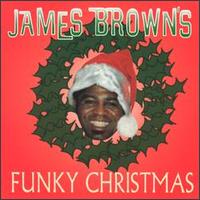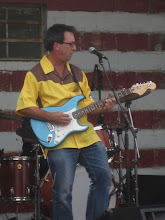The Hardest Working Man in Show Business
 Back in the mid-Eighties, before "Living in America" put him back in the spotlight, James Brown played some surprisingly small-scale shows, including fairly regular appearances at the old Lone Star Café on 5th Avenue in Greenwich Village. I can't imagine that the club held even 500 people, and the stage really wasn't big enough for JB's huge band (close to a dozen people, including a four-piece horn section). And yet, there he was. I was lucky enough to catch a few of those shows.
Back in the mid-Eighties, before "Living in America" put him back in the spotlight, James Brown played some surprisingly small-scale shows, including fairly regular appearances at the old Lone Star Café on 5th Avenue in Greenwich Village. I can't imagine that the club held even 500 people, and the stage really wasn't big enough for JB's huge band (close to a dozen people, including a four-piece horn section). And yet, there he was. I was lucky enough to catch a few of those shows.The first show is the one I'll remember best and most often, because it was one of those rare events that open your eyes and make you see things in a whole new way. An epiphany? Perhaps not that profound, but in the same zip code, I think.
It was a very cold night, but my friends and I arrived many hours early to queue up for the first-come, first-served seating and floor space. The wait was nasty but, we were certain, worth every frosty, windy, grimy (we're talking NYC in the Eighties, after all, not the modern spick-and-span Giulianized version) minute spent in line. This was James Brown, after all! We were about to see a legend; we were going to be transformed. We arrived early enough to get a spot right in front of the stage, perhaps 10 feet from Maceo Parker's mike and no more than 15 feet from where James Brown himself would, eventually, would be standing.
'Eventually' took a lot longer than we had hoped. It was still an hour to show time when we were let in, and of course the band didn't hit the stage on time. When it did, there was more waiting still. First the band played a couple of instrumentals. Then saxophone stud Maceo Parker was introduced, and he played a long solo over yet another instrumental. The band had been on stage close to 20 minutes by the time Danny Ray, the man who had been introducing James Brown for five! ten! fifteen! twenty! twenty five! years, came out to inform us of the obvious: that the Hardest Working Man in Show Biz, the Godfather of Soul, Mr. Please Please Please, the man behind [endless litany of hits reeled off here] was about to make his way to the stage.
And then he did. He was a jaw-dropping sight, but not in a good way. His hair was unnatural both in color and coiffure; it was a weird attempt at feigned youth that made him look instead like an old lady who's just left a very lengthy beauty parlor session, and the effect was that of a helmet of too-fine hair. Beneath the helmet was a jowly face much too old for the outfit and hairstyle he was sporting. I couldn't help recalling the movie version of Death in Venice at that moment, and it made me feel a little ill. The cherry on the sundae was the obviousness of the girdle he was wearing, which created the illusion of slender hips and a flat belly by pushing all the fat up above his belt, giving him a 'stuffed turkey breast' look. This was a man who was not meant to be seen at such close range, I suspect. Up close, he was the Brother From Another Planet. My heart was sinking.
The band hit a slow, mellow groove, nothing too challenging for the old guy, and went into "Have a Funky Good Time," seemingly reaffirming my worst fears: this guy does not have it any more. James was marching in place, none too vigorously, and singing in a fairly limited rasp--the top end of his once-incredible vocal range was long gone by this era. The band sounded great, though, so there was that. And just about the time I was starting to enjoy the groove, a wonderful transformation began to take place. Brown started to sweat a bit, move with a little more animation, sing a little better--suddenly, he didn't look quite so old.
The metamorphosis kicked into high gear when Brown dropped his right hand, stopping the band on the proverbial dime. "What time it is?" he screamed, and someone from the band shouted "1976!" The horns hit a rapid-fire riff, and James Brown was into "Get Up Offa That Thing," and he was sweating more, and moving, and starting to sound damn good. I still wasn't ready to get religion on the show, though, not yet. Not until Brown slapped the mike stand with the butt of his hand, sending it tilting toward the audience; leaned on one knee and caught it just before it bonked a spectator in the head; tossed it back 180 degrees in the other direction; spun away from the mike, dropped to one knee, and caught it just before it hit the bass drum; set the mike aright; and did a full split. In a girdle! I was sold.
The rest of the show was simply tremendous. It included some truly ridiculous kitsch, inicluding: the band's frequent reprise of the "Entertainment Tonight" theme in between songs; a version of "This is A Man's World" in which Brown stopped the band over and over while he paid tribute to randomly grouped dead folks ("This one's for Bob Marley, Martin Luther King, Jr., and Colonel Sanders!"), then took a long, awful keyboard solo, selecting one note (randomly?) and holding it while grinning at the band as if seeking their approval; and a truly dreadful, Vegas-y version of "Please, Please, Please" to close the set. None of it mattered. Through the extraordinarily good ("Cold Sweat," "Papa's Got a Brand New Bag," "Hot Pants," etc. etc.) and the embarrassingly show biz-y, Brown was immensely entertaining, a man of varied, remarkable, mysterious and occasionally befuddling gifts, and truly the Hardest Working Man in Show Business. By the time Danny Ray had draped Brown's shoulders in his regal cape and Brown had tossed it off several times, I knew I had experienced something very special, the likes of which wasn't likely to happen again. I was right, by the way; the other Brown shows I saw at the Lone Star, while fun and very entertaining, weren't nearly as exhilarating.
There really is no way to overestimate the importance of James Brown's music, I don't think. The guy influenced just about everyone with his showmanship and his many, many musical innovations. I'm glad I got a chance to experience some of that magic, and hope y'all have similar memories of this great man.
Labels: music


6 Comments:
At 10:10 AM , david j said...
david j said...
This comment has been removed by a blog administrator.
At 10:12 AM , david j said...
david j said...
Great story!
I got to see him in the early 70's and it was life changing. His King lps and early Polydor lps are still cherished in my vinyl collection. They were also light years ahead of their time, with the in between song bits and samples, none of which gets preserved on compilations.
I'll also never forget his appearances on Ed Sullivan in the sixties when he was just as popular as the Beatles but just not to the same people.
"Say It Loud! I'm Black, I'm Proud!"
At 8:33 PM , Anonymous said...
Anonymous said...
I saw him twice - in 1982 (the day Joe Tex died - OPENING ACT Wilson Pickett informed us of that fact) at the Warner Theatre in downtown Washington D.C., once at Wolf Trap, a shed in the Virginia suburbs of Washington.
Two VERY different crowds - the Warner crowd was older and about 95% black, styled like an old R&B revue with an MC, a comedian (who told white people jokes which prompted the large woman next to me to dig her elbow into my ribs and go "Laugh honey!" - which I did, he was pretty funny), an impressionist and of course the unreal pairing of Wilson Pickett and James Brown.
The Wolf Trap show was just the opposite - just JB and his band, 95% white suburban folks who would never think to venture downtown. Both very good shows, neither as awe inspiring as the one you describe.
I am VERY glad I got to see him. Some of the best shows I've seen over the years have been by supposedly over the hill soul acts - Wilson Pickett was amazing both times I saw him. Same with the Four Tops when Levi Stubbs was singing lead. I saw Solomon Burke two years ago and that was terrific as well.
At 8:24 AM , Anonymous said...
Anonymous said...
I saw JB in the early '60s doing a live outdoor show in NYC. I can still clearly remember being totally blown away.
And in the late '70s, I had the opportunity to see and interview one of my all-time favorite groups, the Drifters. One of the questions I asked them during the interview was what was the difference between touring in the '50s and touring in the '70s. Their answer was a classic. "In the '50s, you'd come out after a show and your hubcaps would be gone. Now you come out after a show, and your whole damn car's gone".
During the Drifters' opening night show, which I was covering for a local rock and roll radio program, they asked for requests from the audience. I stood up and asked them to do one of my favorite Drifters songs, "When My Little Girl is Smiling". It stopped them cold. From the stage, they told me that they hadn't even tried that song in years and apologized.
I enjoyed the show so much I took my wife back the next night to see them. When it came time for the requests portion of the show, they spotted me in the audience and said "We know what that guy wants to hear" and broke immediately into "When My Little Girl...". They had actually practiced the song since the night before, and that very thought touched me deeply.
Man, those were the days...
At 5:20 AM , Wendy said...
Wendy said...
I agree, great story!
Quite a legacy he left....
At 10:17 AM , Tom Meltzer said...
Tom Meltzer said...
Lots of great stories here, folks. Thanks!
Post a Comment
Subscribe to Post Comments [Atom]
<< Home